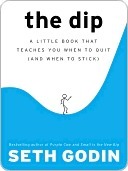More on this book
Community
Kindle Notes & Highlights
The opportunity cost of investing your life in something that’s not going to get better is just too high.
It’s easier to be mediocre than it is to confront reality
When the pain gets so bad that you’re ready to quit, you’ve set yourself up as someone with nothing to lose. And someone with nothing to lose has quite a bit of power. You can go for broke. Challenge authority. Attempt unattempted alternatives. Lean into a problem; lean so far that you might just lean right through it.
Doug needs to leave for a very simple reason. He’s been branded. Everyone at the company has an expectation of who Doug is and what he can do.
The time to look for a new job is when you don’t need one. The time to switch jobs is before it feels comfortable. Go. Switch. Challenge yourself; get yourself a raise and a promotion. You owe it to your career and your skills.
Strategic quitting is a conscious decision you make based on the choices that are available to you. If you realize you’re at a dead end compared with what you could be investing in, quitting is not only a reasonable choice, it’s a smart one.
Quitting is better than coping because quitting frees you up to excel at something else.
On the other hand, when was the last time you heard about someone who stuck with a dead-end job or a dead-end relationship or a dead-end sales prospect until suddenly, one day, the person at the other end said, “Wow, I really admire your persistence; let’s change our relationship for the better”? It doesn’t happen.
You’re Astonishing How dare you waste it.
If it scares you, it might be a good thing to try.


